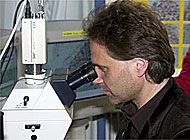
Staging plays is an exacting science

The curtain has fallen on a two-day job swap between Basel's theatre director and a chief researcher in the chemical industry.
Director, Michael Schindhelm, and biochemist, Hans-Peter Wessels, staged the swap as part of Basel’s contribution to Switzerland’s week-long festival of science.
Their aim was to highlight the similarities and differences between the worlds of science and culture.
“I was quite curious because I don’t really have a theatrical background, not even as a visitor,” said Wessels, managing director of the centre for pharmaceutical sciences in Basel. “I must confess that I very rarely go to the theatre.”
Schindhelm, on the other hand, who is originally from the former East Germany, studied quantum chemistry in Russia before he arrived at the stage door.
“By the time I was 20, I was already more attracted by the arts, so sooner or later I had to make the switch,” he said. “In the former GDR as in many eastern countries, many people like myself decided to go into the sciences because, in the ideological sense, you were more free than in the arts.”
Both men agreed that the stage and the laboratory lead to different working practices.
“On a typical day, a PHD student comes into the lab, does a lot of experiments, leaves about 10, 12 or even 16 hours later, goes to sleep and comes back again the next morning,” said Wessels.
“The older the researcher and the higher he climbs in the hierarchy, the more work is dedicated to writing papers, analysing papers of other people, giving talks and communicating within the scientific community.”
“There is no such thing as a typical day in the theatre,” said Schindhelm. “It is possible that on the day of a premiere, one of your singers falls ill so you have to find somebody else who is able to sing this part.
“At that very moment, this replacement might be in Paris or London or Berlin and has no idea about your production. There’s no time for rehearsal. It’s a horror and it’s entirely unpredictable what will come out of this situation.”
At the end of two days, Schindhelm was adamant he would never return to a scientific career.
However, Wessels expressed a few regrets that his time in the theatre had been so brief. “I have a personality which is always tempted by other things and gets quite easily distracted by interesting jobs and professions so working at the theatre seems very attractive to me and very fascinating.”
When it comes to similarities in the two jobs, it is the question of finance which dominates. Science in Switzerland has to fight to stay competitive, said Wessels, and funding has to reflect that fact.
Schindhelm agreed that money was always an issue: “We live from subsidies, we need financial support from the public and my job is very often to convince politicians that it is very important and necessary to give us these subsidies because otherwise this theatre won’t exist anymore.”
On another point, theatre director and chemical researcher agreed – there’s room for more synthesis between their two worlds.
“Scientists are confronted with serious issues within society about what they should and should not do,” said Wessels.
“For me, theatre also has a very important function in provoking society to debate certain questions. So I think there are important issues going on in science and around science which would be very worthwhile for theatre to pick up on.”
by Vincent Landon

In compliance with the JTI standards
More: SWI swissinfo.ch certified by the Journalism Trust Initiative






























You can find an overview of ongoing debates with our journalists here . Please join us!
If you want to start a conversation about a topic raised in this article or want to report factual errors, email us at english@swissinfo.ch.